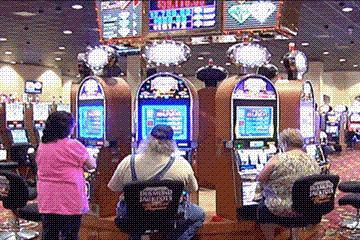
VictoryLand casino
The justices of the Alabama Supreme Court seem convinced that electronic bingo is legal--except, of course, when they are declaring it illegal. Is it any wonder the public is confused?In a case styled Houston County Economic Development Authority (HEDA) v. State of Alabama, the high court recently found that bingo can be played only outside of "machines and electronic circuitry." In reaching this conclusion, the Supremes pointed to Barber v. Cornerstone, 42 So. 3d 65 (2009), a case in which they concocted a six-point test to define bingo.
But get this: Just one week after releasing the Cornerstone decision, the high court issued a ruling that indicates the machines at VictoryLand casino in Macon County are legal. That case is styled Macon County Greyhound Park Inc. v. Knowles (2009). In that case, a woman named Sherry Knowles claimed she had won a jackpot of at least 40,000,000 credits, while VictoryLand argued that the play was not a valid win.
In the Knowles ruling, the Supremes state that bingo in Macon County is allowed by Amendment No. 744 to the Alabama Constitution, and they note the prominent role the county sheriff plays in overseeing the game. From Knowles:
Amendment No. 744 further authorizes the sheriff of Macon County to “promulgate rules and regulations for the licensing and operation of bingo games within the county.” In force at all times relevant to this action were the “Second Amended and Restated Bingo Regulations for the Licensing and Operation of Bingo Games in Macon County” (“the sheriff's regulations”), promulgated by the Macon County sheriff pursuant to Amendment No. 744.
The stated purpose of the sheriff's regulations is to “adopt the policy of the Attorney General in limiting the conduct of Class B bingo gaming in Macon County thereby allowing the Sheriff to more effectively regulate and enforce the proper conduct of bingo games.”
The high court even notes that it is up to the sheriff to define bingo. From Knowles:
“Bingo” is defined in § 1 as
“any game of chance known as bingo, including any bingo game permitted by federal law, (whether or not electronic, computer, or other technologic aids are used in connection therewith) which is played for prizes, with cards bearing numbers or other designations, and [in] which the holder of the card covers such numbers or designations when objects, similarly numbered or designated, are drawn or electronically determined, and in which the game is won by the first person covering a previously designated arrangement of numbers or designations on such cards. The bingo game must incorporate the typical features of traditional bingo, including, but not limited to, a grid of five horizontal and five vertical squares, numbers randomly selected, and a preordained winning pattern. Alternative entertaining displays such as spinning reels and other video or mechanical graphics are permitted but must not affect game play. Just as in traditional bingo halls, players on electronic bingo machines must compete against one another. Consequently, the electronic machines must be linked so that players are competing against each other. . . . "
That is the Macon County sheriff's definition, and the Alabama Supreme Court seems to have no problem with it. The definition clearly states that bingo can be played in an electronic or computerized format, and the Alabama Supreme makes no objection to that. At no point do the Supremes state that Sherry Knowles was playing on an illegal machine.
A reasonable person could argue that Knowles trumps Cornerstone. After all, Cornerstone was issued on November 13, 2009, while Knowles was released on November 20, 2009, The cases involve a number of "disparate issues" (as lawyers like to say), so they are not exactly on point with each other. But it's clear that Knowles came after Cornerstone, and at the time of the Knowles ruling, the Alabama Supreme Court considered the machines at VictoryLand to be legal.
How deep does the confusion on electronic bingo get in Alabama? In a January 7 memo, Attorney General Luther Strange cited the HEDA ruling and encouraged state prosecutors to enforce laws against illegal gambling. Governor Robert Bentley responded by saying the state does not have the resources to relentlessly pursue gambling cases.
Some observers have suggested that Strange's memo indicates his office plans to step back from pursuing gambling cases. Writes Brian Lyman, of the Montgomery Advertiser:
However, Strange's memo was more reserved about what role, if any, the attorney general's office — which has engaged in high-profile activity against gambling over the past four years — would continue to have.
Strange said his office would continue to provide answers to legal questions, but told D.A.s to contact the newly-formed Alabama Law Enforcement Agency (ALEA) for "assistance or additional manpower" in enforcing the state's gambling laws.
Mike Lewis, a spokesman for Strange, said Thursday the memo was meant to instruct "local law enforcement on what is legal and illegal and encouraged to follow the guidelines and the law." However, he declined to say whether the attorney general's office would continue to take the lead on gambling prosecutions.
What does the future hold? That is anyone's guess, and clarity does not seem to be coming from courtrooms or law firms. The Alabama Supreme Court is not the only legal entity in the state that can't seem to get its story straight about electronic bingo. We know of at least one other one.
(To be continued)
